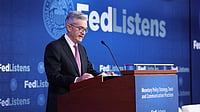Information technology heavyweight Tata Consultancy Services ushered in the Q1 earnings season on an uncertain footing, with its underwhelming June quarter results prompting tempered reactions from brokerages. In response, shares of the tech giant tumbled as much as 2.5% on July 11.
The IT bellwether reported a 3.3% sequential drop in constant currency revenue, with topline coming in at $7,421 million. The sharpest drag came from its India business, which fell 31.4% on quarter,largely attributed to the ramp-down of the BSNL deal which made up 2.6% of the overall decline. The international business also saw a minor contraction of 0.5% on a sequential basis.
On the profitability front, EBIT margin improved by 30 basis points to 24.5%, aided by lower third-party costs. However, these gains were partly offset by investments in capacity building and reduced utilisation.
Net profit for the quarter received a boost from higher other income, softening the blow from sluggish revenue, to come at Rs 127 billion in Q1. However, deal wins narrowed compared to the previous quarter, and the shortfall, paired with a decline in international business momentum, led to a wave of price target adjustments.
Adding to the cautious mood, TCS also refrained from confirming salary hikes for FY25, citing macroeconomic headwinds and a slowdown in deal closures. The company signalled it would revisit the matter once conditions stabilise, an unusual pause from a firm known for predictable people policies.
Looking through the uncertain times ahead for the IT bellwether, global brokerage Nomura cut its price target for the stock to ₹3,780 from ₹3,820, even though it held on to a ‘neutral’ stance on TCS. It sees limited scope for margin expansion in FY26 and also shaved off its FY26–28 earnings estimates by 1–2%.
UBS, though more optimistic with a ‘buy’ rating, also trimmed its price target marginally to Rs 3,950. It further noted that TCS continues to underperform larger Indian IT peers across all key timeframes. While acknowledging that the stock is now trading near its 10-year average PE, UBS believes much of the de-rating is behind us and that the company could deliver average industry growth in FY26, even excluding the one-off BSNL contract.
Joining the queue of caution, HSBC also weighed in with a ‘neutral’ rating and a target of ₹3,665, citing concerns over profitability and weaker-than-expected commentary on global demand. JPMorgan echoed this sentiment, maintaining its ₹3,650 target while pointing out that margins were hurt by negative operating leverage, despite supportive forex movements and lower hardware costs.
The muted performance had ripple effects across the American Depository Receipts (ADRs) of Indian IT companies listed on the New York Stock Exchange. Shares of Infosys and Wipro, both of which trade on the NYSE dropped sharply overnight following TCS’ results. Infosys ADRs slid 4%, while Wipro fell 5%, highlighting how closely TCS’ Q1 results have already shaped hopes for Infosys and Wipro’s Q1 shows, indicating likely pressure on TCS as well as IT stocks in trade today.
Despite large-scale cautiousness over TCS, Nuvama Institutional Equities offered a slightly moee optimistic view. The brokerage retained its ‘buy’ rating on the stock and adjusted its target price to ₹3,950 from ₹4,050, calling valuations attractive in light of recent underperformance.
“The demand environment may remain challenging over the next couple of quarters, but we’re positive on the medium-to-long term,” the brokerage said. “Technology debt across global enterprises is substantial, and once macro clouds lift, IT spending will return with vigour.”
Nuvama also believes the sharp ramp-down in the BSNL deal was expected, while international business was largely stable. The firm expects a gradual recovery in global tech demand and notes that TCS, trading at around 21.5x FY27 earnings, is now in line with its long-term average, creating room for upside if sentiment improves.




























